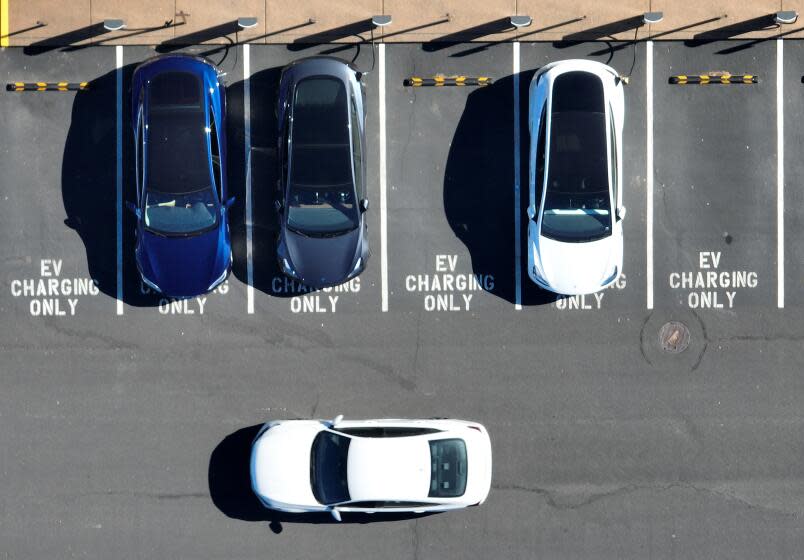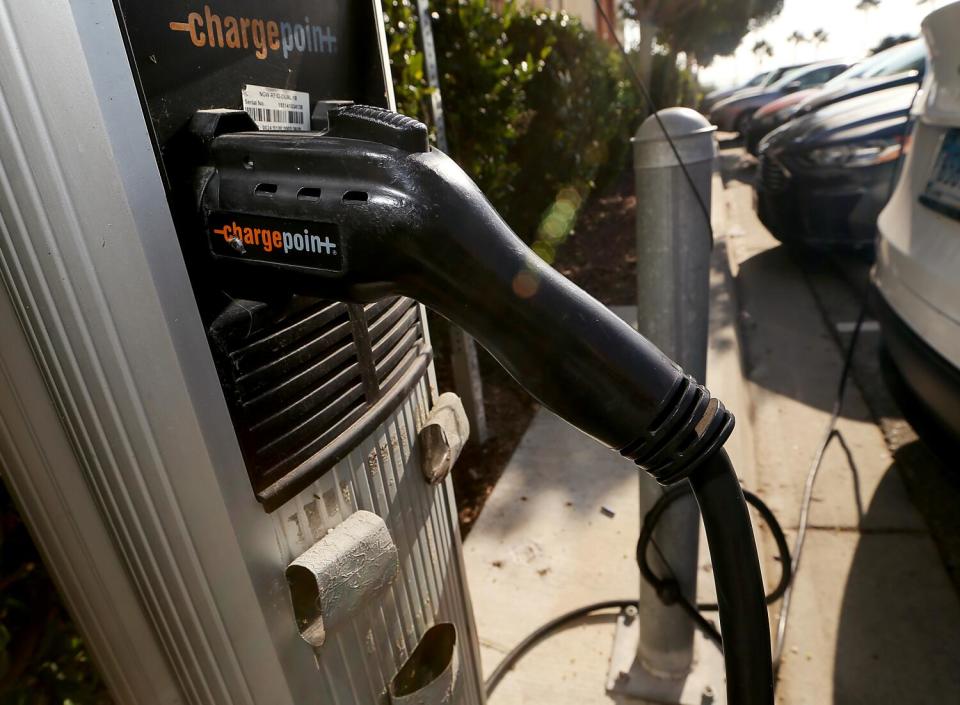As EVs gain traction, how will California pay for road repair?

California drivers already rumble across some of the worst pavement in the nation, but the poor condition of the state’s roads and highways could get far worse in coming years as electric cars take over and gasoline cars fade away, according to state analysts.
That’s because money for road repair and maintenance depends on the state’s motor fuel taxes, and that revenue is expected to plunge. Electric vehicles don’t use gasoline, so EV drivers don’t pay the gas tax.
A new report from the Legislative Analyst’s Office warns that loss of state fuel tax revenues could have dire consequences for the upkeep of roadways. Taxes on gasoline and diesel fuel now total about $14.2 billion a year. More than $4 billion annually could disappear by 2035, when the state’s ban on the sale of new fossil fuel cars takes full effect.
Read more: How to score an instant rebate on a new or used electric car in California
The news comes at a time when the state is wrestling with a $37.9-billion budget deficit that has forced cuts to climate programs and other services. The possible solutions outlined in the report are likely to prove unpopular: raise taxes, raise fees or slash spending on road repairs, maintenance and construction.
California has positioned itself as a world leader in the fight against climate change. The aggressive transition to 100% zero emission cars and light trucks by 2035 is key to the plan. Transportation accounts for about 40% of California’s greenhouse gases — about three-quarters of that from passenger cars and trucks.
Stephen Finnegan, government affairs manager for the Automobile Club of Southern California, notes that "roads and transportation are fundamental to life in California, critical for our economy, our quality of life, and our safety." A fundamental transformation in a culture long dependent on fossil fuel transportation won't be without new costs.
But cutting back on road spending isn't likely to please California drivers, who traverse some of the worst in the country. A 2022 ranking of state-by-state road health by the American Society of Civil Engineers puts California in second-to-last place, tied with six other states with a grade of D. Only one state's rating was worse — Mississippi, which got a D-minus.

“There’s so many infrastructure projects at the end of their useful life,” said Andreas Groehn at the private Berkeley Research Group. “Replacing them will be increasingly expensive.”
The traditional way to make up for road fund shortfalls is to increase motor fuel taxes.
The gasoline tax currently stands at 57.9 cents a gallon, among the highest in the nation, and according to state law it rises each year with inflation. Gas tax hikes are always a hard sell, and raising them to make up for revenue loss due to electric vehicle alternatives might be tougher still since gasoline users would be the ones paying.
Still, maintenance of 52,000 miles of state highways and 333,000 miles of local roads must be paid for somehow.
Spreading road funding costs to electric vehicles is another option. In California, EV owners with model year 2020 cars or later pay a special registration fee of $108 a year per vehicle. That is expected to add $80 million to the road funding budget, according to the California Department of Transportation. Even as EV market share grows, a fee at that level won't be near enough to fill the funding gap, the report said.
More than 30 states have implemented EV registration fees, most between $100 and $200. Raising EV fees much higher, though, risks alienating some buyers as they consider trading their fossil fuel cars and trucks for cleaner alternatives.
Annual registration fees, which are pegged to a vehicle's market value, could also be raised, but such a move would almost certainly provoke a political battle.
Read more: Environmentalists hate plug-in hybrids. Do these cars get a bad rap?
The most provocative idea in the analyst's office report is a road fee, based on total vehicle miles traveled. The state has been testing such a system for several years. It would use GPS satellite information to track a vehicle's mileage, and set fees accordingly.
Supporters see road fees as a modern, technological solution to an increasingly outmoded gasoline tax, a 100-year-old levy originally set at 2 cents a gallon in 1923.
“There is information and data out there to help design a more optimal system than currently exists,” said Kevin Christensen, a partner of Groehn’s at Berkeley Research Group. Most options for filling the gap amount to tweaks in the system, but solutions “need to be more holistic and thoughtful,” he said.
A wholesale shift to road fees presents complications, such as how to calculate travel on rural private roads and privacy concerns among those who don't want the government tracking their movements (even though Google, Apple and other tech companies do that now).
The Auto Club's Finnegan is vice chair of a state committee studying the road fee idea. Gasoline taxes are well understood by the public and collection is easy, he said. Moving to a radically different system for road funding would be tough. But "the whole point is to figure out the best way forward, and that's what's being worked out right now."
The analyst's office recommends that the Legislature "continue to monitor" the impending road funding shortfall and "begin developing a long-term plan for how to address future revenue declines."
Neither the Assembly nor the Senate has plans to grapple directly with the issue in the upcoming legislative session, though the office of Senate Transportation Committee Chair Lena Gonzalez (D-Long Beach) said a 10-year transportation needs assessment from the California Transportation Commission, due by year's end, will set the stage for focused deliberation.
This story originally appeared in Los Angeles Times.


